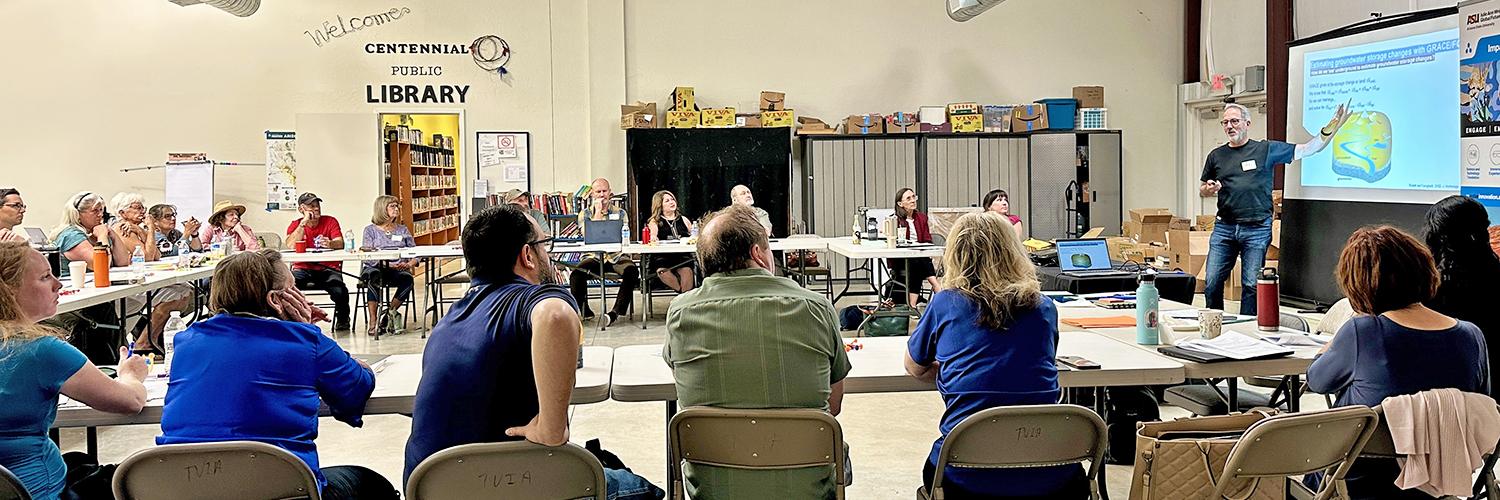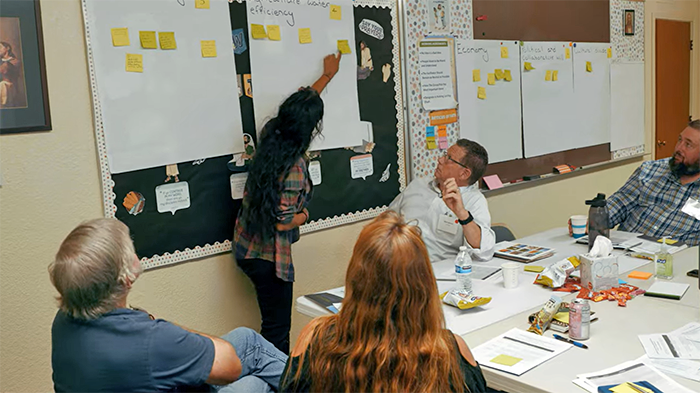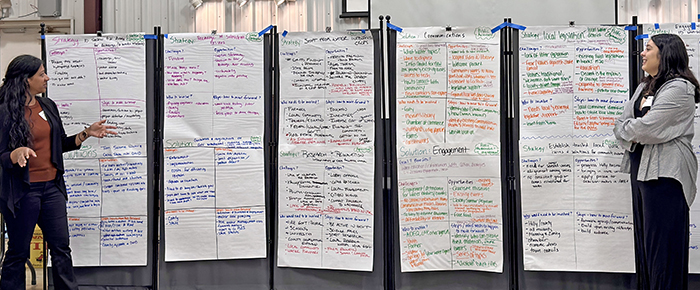
Momentum to address Arizona’s rural groundwater issues
Groundwater is declining across Arizona. While the state’s 1980 Groundwater Management Act addressed the issue in more urbanized areas, much of rural Arizona’s groundwater remains unprotected. However, there is growing momentum, led by residents and local leaders, to act on rural groundwater.
The Arizona Water Innovation Initiative, a multiyear partnership with the state led by Arizona State University’s Julie Ann Wrigley Global Futures Laboratory in collaboration with the Ira A. Fulton Schools of Engineering, is integrating science, policy and community engagement to empower Arizona residents as they work on rural groundwater issues.
By integrating state-of-the-art research on the state’s groundwater status with community-led rural groundwater engagement and policy support, the Initiative is taking an innovative approach to a critical water issue that affects all Arizonans.
State-of-the-art groundwater research
A new study led by Karem Abdelmohsen, a postdoctoral research scholar with the Arizona Water Innovation Initiative, indicates that throughout the Colorado River Basin, groundwater losses over the last two decades have been greater than the total capacity of Lake Mead.
Meaning, in short, that not only is the Colorado River itself shrinking, but so is groundwater in the Basin itself.
“Despite knowing that groundwater declines are happening, the degree was still surprising,” says Abdelmohsen. “We found that groundwater, often seen as a back up for surface water flows, loss is on par or even more than withdrawals from the Colorado River itself.”

Jay Famiglietti, a leading groundwater expert at ASU and senior author of the study, says that this latest research paints an alarming picture of the state of groundwater in the southwestern US. While most of the Colorado River Basin is losing groundwater, the biggest overdrafts are occurring in Arizona, particularly in the southeastern and western parts of the state.
“It is well documented that Colorado River flows are decreasing. What we’ve been able to add here is the degree to which groundwater is also declining in this same area, which is a double whammy,” says Famiglietti. “The Arizona picture is particularly alarming, especially for areas that are completely dependent on groundwater.”
Rural groundwater community engagement
So, what are Arizona residents to do with this information?
The two biggest areas of concern from the work led by Abdelmohsen and Famiglietti include La Paz and Cochise counties, both of which have been focal areas for community-led rural groundwater workshops organized by the Impact Water - Arizona program of the Arizona Water Innovation Initiative.
During the fall of 2024, Impact Water - Arizona partnered with the Babbitt Center for Land and Water Policy, a center of the Lincoln Institute of Land Policy, to co-host a community-led workshop addressing water challenges in the Sulphur Springs Valley of Cochise County.
That workshop not only led one of the biggest water users in the area to reduce their groundwater use by 14 percent, but it also resulted in the creation of the Sulphur Springs Water Alliance, which continues to coordinate community action in the area.

“This workshop brought people together in a way that doesn’t happen often, with farmers, ranchers, residents and community leaders all in the same room, having real conversations about groundwater challenges in the valley,” said Katherine Hamberger, the coordinator of the Alliance. “It helped spark ideas, build connections and push things forward in a way that still has an impact today."
Following the success of that workshop, the Impact Water team, led by director Susan Craig, released a call for interest open to communities across Arizona to develop their own Rural Groundwater Resilience Workshops and developed a Rural Groundwater Resilience Toolkit.
“I’m passionate about working on locally driven strategies to find real, community-centered solutions to Arizona’s water challenges,” said Craig. “While rural groundwater reform remains uncertain, these workshops create space to share data, hear directly from those impacted and build the trust and momentum needed to activate change.”
Several communities across the state responded to the call for interest and in March the Impact Water team co-hosted a workshop with local community partners including County Supervisor Holly Irwin and local residents in La Paz County.
“We were provided with updated data regarding our groundwater basins, which outlined the severity of our situation within La Paz County,” Irwin said about the workshop, where Famiglietti presented some initial data. “It also allowed for the community to interact and give feedback on the information which is critical for me to continue to represent my constituents' needs and concerns for our future.”
In late May, Governor Katie Hobbs visited the area and spoke with several workshop participants, as well as met with rural county supervisors and other local, rural groundwater leaders from across the state, to hear about their unique challenges with aquifer depletion and subsidence.
“Having the Governor come visit our ‘ground zero’ was a great opportunity to make our voices heard,” said Gary Saiter, La Paz County resident and general manager of the Wenden Domestic Water Improvement District. “Any opportunity that we have to tell our story is good for us. It simply is not right to allow corporate farms and corporations to start pumping water at levels that threaten the future of the people who live here. We have to take action now. Governor Hobbs is welcome anytime as we continue to tell our story and try to get action.”
The Arizona Republic subsequently reported that Hobbs is committed to addressing rural groundwater issues and would consider calling a special legislative session if the conditions were right.
Seeking water solutions
It is no secret that water issues can be challenging to discuss because of the complexity involved, but breaking down that complexity is something that the Kyl Center for Water Policy, led by Sarah Porter, has been at for years.

For example, in the case of La Paz County, groundwater management is particularly complex because it is home to three of Arizona’s four designated "transportation basins," areas where groundwater can legally be exported to urban areas to increase water supplies.
Each basin has specific rules around who can pump, how much and for what purposes, and the law includes limitations that aim to protect local water supplies and prevent over-extraction in rural areas. No transfers have been made to date, but with the uncertainty surrounding Colorado River supplies, it is becoming increasingly likely.
At the workshop, Porter was able to share helpful tools including the Arizona Water Blueprint and Groundwater Level Change App, as well as explain the challenges and opportunities around transportation basins that many residents expressed gratitude for having the chance to learn more about.
Looking ahead
As momentum builds to address rural groundwater declines in rural Arizona, both research on groundwater depletion and the community engagement efforts continue.
“We’ve made some really good progress on putting numbers to Arizona’s groundwater declines, and that work will continue,” says Famiglietti. “We are always trying to use higher resolution data and to improve our analyses. We found that groundwater losses are accelerating in some parts of Arizona and now are researching the causes.”
The Impact Water - Arizona team is currently in the process of working with communities on rural groundwater challenges in the Coconino Plateau area of northeastern Arizona and in Patagonia in the southeastern part of the state.
"It goes without saying that the emerging groundwater issues in each community are very different. There is no one-size-fits-all solution for rural groundwater protection,” says Michelle Oldfield, community engagement specialist with Impact Water - Arizona. “We know this kind of engagement works. We’re seeing meaningful progress when people are informed, heard and empowered. It’s laying the foundation for lasting, community-led action.”
Related stories:
- An Arizona community comes together to bolster rural groundwater resilience
- Community partner profile: La Paz County resident DeVona Saiter discusses rural groundwater issues
- Empowering rural communities with trustworthy groundwater information
- Supporting rural communities to protect their groundwater
- Navigating uncertainty: Collaborative solutions for sustainable water management in the rural west